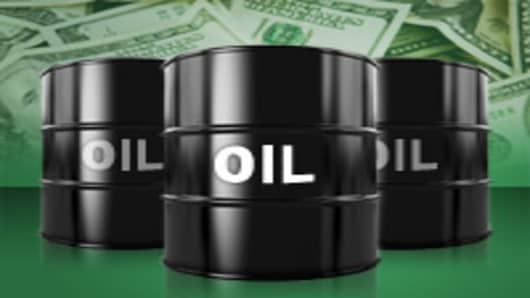The risk premium due to Iran could be contributing as much as $15 to $20 a barrel to global oil prices, according to some analysts and traders.
Brent crude oil futures, the global benchmark for crude oil price, topped $124 a barrel Thursday morning — the highest price since last May.
The concern that Iran will retaliate against sanctions imposed by Western nations and close the Strait of Hormuz — a vital waterway that carries about 20 percent of the world's oil supply — is a major factor in the rise in Brent futures.
"Iran slamming the door on the [International Atomic Energy Agency] inspectors as hard as they did was a jolt, followed by the statements from the Supreme Leader, the oil market is responding to a hardening of positions, to the increasing sternness of the faceoff," said Daniel Yergin, chairman of IHS CERA.
Representatives from the IAEA arrived on Monday for talks on Iran's disputed nuclear program. But, on Wednesday the U.N. nuclear watchdog said it has failed to secure an agreement with Iran and that the Islamic Republic has rejected a request to visit a key military site.
Iran's Supreme Leader Ayatollah Ali Khamenei rejected accusations that Iran is pursuing a nuclear weapon, and insisted the country's policy would not change despite ramp-up sanctions.
Timeline of Oil Price Surge:
November 21, 2011: Brent crude futures were trading around $105-$106 dollars in late November when French President Nicholas Sarkozy started talking about an embargo of Iranian oil by the European Union.
His proposal came after the International Atomic Energy Agency issued a report on November 8, noting "serious concerns" about Iran's nuclear activities.
January 3, 2012: Brent crude prices started the new year nearing $110 a barrel, fueled by the United States promised sanctions targeting Iran's central bank and financial sector as well as renewed interest in this global benchmark contract by major commodity indices.
January 23, 2012: Prices remained range-bound for the next few weeks, but have jumped more than $10 a barrel since late January as Iran has gone on the offensive. After the EU officially announced it will ban Iranian oil imports — Iran countered and threatening to close the Strait of Hormuz.
February 21, 2012: Iran announced it is banning oil exports to the U.K. and France. Then talks between Iran and U.N. nuclear inspectors broke down on Tuesday. As Iran's leaders remain defiant in continuing the country's nuclear ambitions, oil prices continue to soar.
The potential threat from Iran has Brent crude not only trading $18 a barrel higher than in November, but at a $3 premium to June. Traders say the "backwardation" in the Brent crude curve is another factor pointing to the immediacy of this potential upside risk to oil prices.
Follow Sharon Epperson on Twitter: @sharon_epperson
Questions? Comments? Email us at marketinsider@cnbc.com



